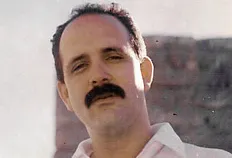José Luis García Paneque is one of five Cuban dissidents who will be released and sent to Spain, international news reports said today. A disillusioned plastic surgeon-turned-headstrong editor of an independent news agency, García Paneque, at left, has been jailed since March 2003. At 45, he leaves prison with a dismal array of illnesses.
A young doctor with a promising career at the Ernesto Guevara Hospital in Las Tunas province, García Paneque flirted with the Cuban dissident movement in the 1990s, his wife, Yamilé Llánez, has told me over the years of his imprisonment. In 1997, he joined a group of young Cubans fighting for democracy. Months later, having been fired for to his anti-revolutionary politics, he turned to the booming Cuban independent press movement. By 2003, he was director of the local independent news agency Libertad.
For his reporting and editing, García Paneque was accused of acting “against the independence and territorial integrity of the state,” and sentenced to 24 years in prison. He spent the last seven being shuffled from prison to prison, collecting illnesses, and being witness and victim to the inhumane conditions under which Cuban political prisoners live. A healthy man in his late 30s at the time of his arrest, García Paneque now suffers from chronic malnutrition, pneumonia, and internal bleeding, and has been diagnosed with a kidney tumor, his wife said.
The journalist has not seen his four children since 2007, when continuous government harassment forced his wife to flee with them to the United States. Here, the family has struggled to survive, and is able to talk to García Paneque for five minutes once a month. “The last time I saw my husband,” Llánez told me over the phone shortly after her arrival in Texas, “he told me that I was responsible for my children, and that I had to do whatever was necessary to make sure they were OK. So we left him.”
As the news of García Paneque’s release circled the globe today, I was the first one to tell Llánez that her husband was reportedly among the five prisoners who would leave Cuba for Spain. Her reaction was silence, shock, and disbelief. She has been told time and again that his release was imminent. Meanwhile in Cuba, Llánez told me later today, García Paneque’s elderly mother scrambled to get to the prison where her son is being held. News of his release for her was bittersweet. To be freed, he has to leave Cuba, and this means that she might never see him again.
